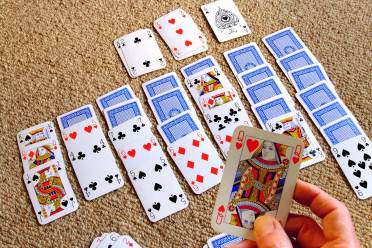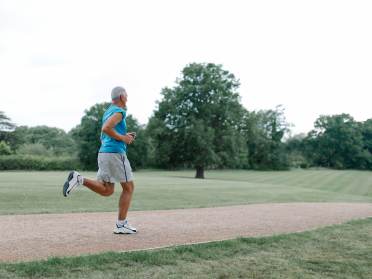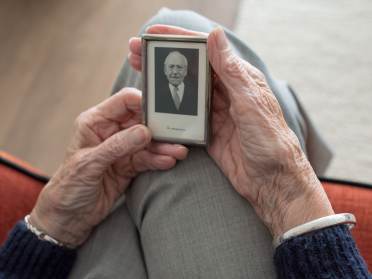Physical exercise can keep the body and muscles strong, and mental activity can be just as beneficial for the brain. In later life, we are at risk of cognitive decline. This risk is even greater when coupled with exhaustion and/or the stress and anxiety that so many of us face.
Stimulating brain games can help to combat loneliness, promote positive wellbeing and contribute to overall brain health.
Here are our top ten FREE games and activities to stimulate your brain health in retirement and beyond.
1. Jigsaw puzzles
In addition to being enjoyable and relaxing, jigsaws can actually help to strengthen your short-term memory. They also help to maintain and practise visual and spatial reasoning. This relates to your perception of space and movement which is incredibly useful and relevant to everyday situations like crossing the road or pouring the kettle. Jigsaws are great to do alone or alongside other people, so why not get your friends or family involved?
2. Wordle
You may have heard of Wordle, the online game that has taken the world by storm. Players have six attempts to guess a random five-letter word with only a colour-coded system to show if they have guessed any correct letters. The word resets each day at midnight making it a perfect, simple way to incorporate some brain training into your daily routine. Share your score with others to ignite some friendly competition and get to know some new words!
If one attempt a day isn’t enough then go to Word Master to play an unlimited number of word challenges. You can also play along with the TV show Lingo – watch on ITV or catch up at any time at ITVHub.
3. Game shows
This might sound simple but watching game shows is a great way of stimulating your brain. Research shows that watching them can also be beneficial for your mental wellbeing.
We’re all guilty of shouting answers at the TV, but how about the next time you sit down to watch your favourite show, you play along from start to finish? This is a fun way for your brain to practise information recall as well as learn some new and interesting facts!
4. Solitaire
It’s very easy to look at a pack of playing cards and be overwhelmed by the number of game possibilities. Solitaire is a one-player game loved by many for being quick, simple and fun. Though there are different variations of this game, the classic version involves arranging the cards into a systematic order.
You can read more about the rules here. As well as providing brain stimulation, Solitaire can also help your brain to relax.
5. Word search
Word searches provide a number of benefits to brain health including general problem-solving skills, spelling, vocabulary and memory retention. You can easily find free word searches online. Choose your searches based on topics you are interested in or how much time you have available to complete them. Check out our very own Audley retirement word search. Set some time aside each day for some quality puzzle time.
6. Sudoku
This classic game is an excellent way to train your brain. Just like in a tactical game such as chess, sudoku requires you to be thinking ahead with every move. This can help keep your brain ‘sharp’ and improve your concentration. Sudoku can be a difficult game, which makes it a great one to enjoy gradually throughout the day. Sitting down to complete one is also a great way to relax and distract your brain from any worries or negative thoughts.
7. Crossword
Crosswords are another classic game that can provide regular brain stimulation. Not only are they a fun and satisfying way to test your general knowledge, but they are also an effective way to preserve memory and cognitive function. Like word searches, you can find free crossword puzzles online with plenty of choices depending on the topic and difficulty. You can also find them in the back of daily newspapers or magazines, making them easily accessible – especially if you are someone who prefers pen and paper.
8. Dots and boxes
The great thing about this two-player game is that it only requires a pen and paper. Draw a grid of dots, then takes turns connecting them with a single horizontal or vertical line. When a box is complete, that player claims the box with their initials before taking an extra turn. Keep going until the grid is full of boxes then count up how many each player has to reveal the winner. This competitive game is a quick and easy source of brain training fun – why not introduce it to your grandchildren or other visitors?
9. Uno
This family favourite can be just as beneficial to your grandchildren’s brains as it is to your own. The different rules applicable to each card are an immediate way of preserving your memory. The colours and numbers provide mental stimulation for your brain, with the nature of the game itself requiring you to practise strategic and logical thinking. Being a 2+ player game, Uno is a highly enjoyable way to get some social interaction and you can guarantee a different game every time!
10. Lumosity
This popular app is considered the world's most popular brain training program, describing itself as a ‘workout for your brain’. Users can take their pick from a range of games in skills such as memory and problem-solving. The games on Lumosity are based fully on scientific research and designed by scientists themselves. Though there are in-app purchases available, the free version of Lumosity will keep you busy with three daily brain games as well as personalised insights on your training.
Looking for even more ideas?
If you're not all gamed out then read more trivia and ideas to stimulate brain health.



































